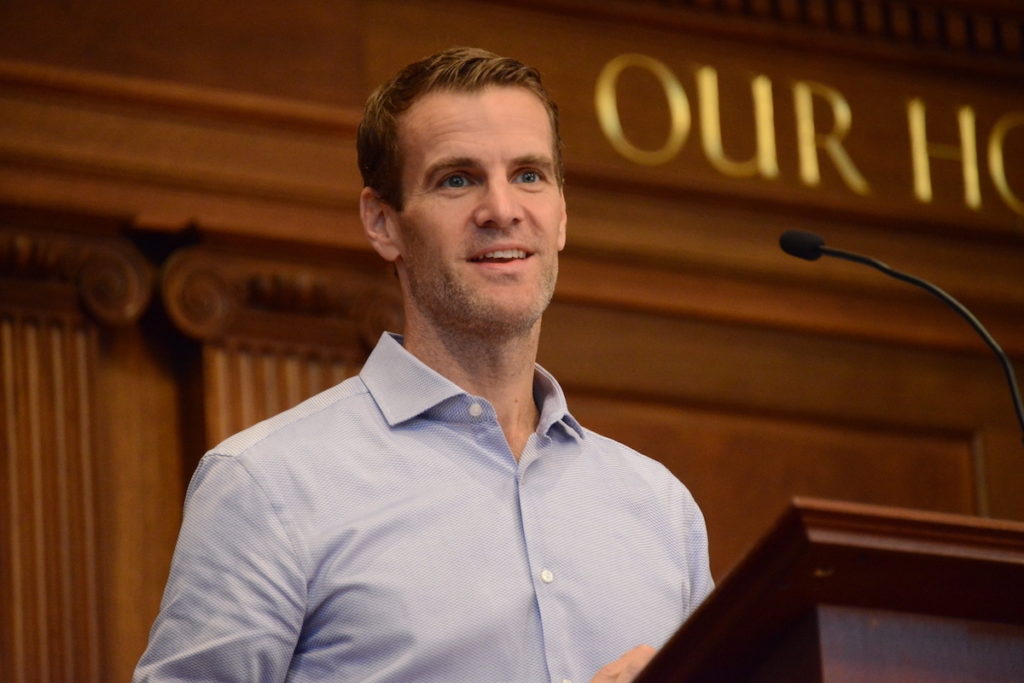Stephen Hoge, President of Moderna, Inspires in Hall
On October 14, Stephen Hoge, president of Moderna Therapeutics, spoke with students in Hall about his company’s development of its mRNA vaccine against COVID-19; his professional trajectory from a physician in New York to leading Moderna’s research and development; and the lessons he has learned along the way.
“Whenever I hear the story of the last year—anything I’ve done over the last decade—told, I’m sort of humbled by it,” Dr. Hoge began. “It sounds great in the retelling, but the living of it, I assure you, was full of lots more uncertainty and self doubt—and even in this moment, a whole lot of questions about whether we’re doing the right thing or enough of it.”
After graduating from Amherst College and earning his medical degree at University of California, San Francisco, Dr. Hoge worked as an emergency room doctor in New York City. “I realized, however, that this wasn’t the way that I was best going to help other people,” he recalls. “Many people viewed what I was doing as God’s work, but it wasn’t actually the thing I was best at. And so I got a bit lost. I had tremendous self-doubt. Imagine spending 12 years of your life training for something—your parents are proud of you, everybody thinks it’s the right thing—and suddenly realizing that it’s not what you were put on the planet to do? But it just didn’t feel right. I was so full of doubt that I left that career to pursue something different—but I didn’t know what that something was.”
He finally found his purpose—the way in which he felt he could actually make people’s lives better—when he joined Moderna in 2012. Today he leads all scientific research and clinical development for Moderna.
“Finding your purpose is most important in choosing how you want to spend your time, but the second thing I’d leave you with is this: You have to ask really good questions to be successful in pursuing your purpose. The way that I do that is through something called science. I came to love what I thought was science in high school, but I didn’t understand it. When I was your age, I thought science was this really cool set of facts about the universe. Biology, physics, chemistry, how things worked. I thought science was a collection of information, that it was knowledge. I was totally wrong. Science is a way of asking questions about something you don’t yet understand, which helps you generate new information, and adding that information to the world. As I began to truly practice science, that’s what I came to love the most about it: It’s an approach to the unknown.”
In joining Moderna and its work using messenger RNA as a means of fighting viral infection, Dr. Hoge was told by many people that it simply couldn’t be done. Yet he and his team persisted; they kept asking Why?; and their scientific approach, technology, persistence, and willingness to take a risk and “bet the farm,” as Dr. Hoge said, has helped result in the saving of millions of lives in the fight against COVID-19.
“I’ve been blessed in my life to choose optimism,” Dr. Hoge said. “I’ve come to learn that optimism is not a right. It’s not something that we are born with. It is something that others can give to us or take away from us. In that sense, when I look back at the privilege of my life and think about my responsibility going forward, it is that we have to find a way to give optimism to each other—believe that we can actually make our lives better or better for those around us. That precious gift of optimism is something that we need to defend and protect for each other.”
In conclusion, Headmaster Brennan underscored for students in Rousmaniere Hall, “Thanks to Dr. Hoge and his colleagues—his fellow scientists, doctors, researchers, entrepreneurs—we are able to be in this room together today, shoulder to shoulder, with the knowledge that our COVID-19 vaccines will—if not spare us from contracting the virus—spare us at least the worst of its effects. That is no small comfort, and no small step toward our country and our world being free from this pandemic’s grip.”

